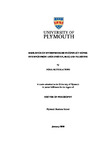Resilience of Entrepreneurs in Conflict Zones: Evidence from Afghanistan, Iraq and Palestine
| dc.contributor.supervisor | Moizer, Jonathan | |
| dc.contributor.author | Althalathini, Doaa | |
| dc.contributor.other | Plymouth Business School | en_US |
| dc.date.accessioned | 2020-08-28T15:51:15Z | |
| dc.date.issued | 2020 | |
| dc.identifier | 10563304 | en_US |
| dc.identifier.uri | http://hdl.handle.net/10026.1/16204 | |
| dc.description.abstract |
In places where there is violent conflict and substantial institutional deficiencies, entrepreneurial activity increases as self-employment becomes a necessary survival and coping mechanism and strategy. Women within context affected by long-term conflict are also more likely to engage in entrepreneurship whilst experiencing additional challenges to those experienced by women entrepreneurs in non-conflict affected developing economies. With the temporary or permanent loss of household income, women contribute an increased share of income-generating activities and may often be the main or sole providers for their families. Therefore, researching entrepreneurship in contexts of conflict is important for advancing our knowledge of entrepreneurship practises, albeit this remains very limited research. The limited evidence available to date suggests that entrepreneurs are resilient in confronting political and economic instability, and this is dependent upon factors both within and outside their control. Therefore, this study aims to contribute to entrepreneurship and resilience literature from a contextual and institutional perspective. The study explores and analyses how entrepreneurs build and develop resilience within institutional constraints to maintain or thrive their businesses in the context of conflict zones. This qualitative study explores the entrepreneurial experiences of 30 entrepreneurs in total, 16 women and 14 men, in the three conflict-affected zones of Afghanistan, Iraq and Palestine. Those countries were chosen due to their cultural similarities and easier access to personal networks. Despite the regulative, normative and cognitive institutional constraints that entrepreneurs face, they are willing to start businesses and work persistently in response to institutional voids in order to maintain their businesses. The conflict situation in addition to religious values have shaped the entrepreneurial motivations, challenges and resilience of entrepreneurs in conflict zones. Entrepreneurship as a process has also contributed to entrepreneurs’ resilience. Resilient entrepreneurs are thus the ones who overcome and thrive in the face of adverse social, economic and political conditions. They mainly rely on their own competencies in addition to the social support they believe they have which gives them feeling of control and protection, where they have positive perceptions of their contexts. They are more able to navigate resources, grow their businesses and create economic and social impact through providing jobs and changing attitudes. The findings have both theoretical and practical implications that can promote entrepreneurship and resilience of entrepreneurs which will increase the number of entrepreneurial activities in such fragile contexts and promote peacebuilding. | en_US |
| dc.language.iso | en | |
| dc.publisher | University of Plymouth | |
| dc.rights | Attribution 3.0 United States | * |
| dc.rights.uri | http://creativecommons.org/licenses/by/3.0/us/ | * |
| dc.subject | Afghanistan | |
| dc.subject | Iraq | |
| dc.subject | Palestine | |
| dc.subject | Resilience | en_US |
| dc.subject | Entrepreneurship | en_US |
| dc.subject | Conflict zones | en_US |
| dc.subject | Institutional theory | en_US |
| dc.subject.classification | PhD | en_US |
| dc.title | Resilience of Entrepreneurs in Conflict Zones: Evidence from Afghanistan, Iraq and Palestine | en_US |
| dc.type | Thesis | |
| plymouth.version | publishable | en_US |
| dc.identifier.doi | http://dx.doi.org/10.24382/759 | |
| dc.identifier.doi | http://dx.doi.org/10.24382/759 | |
| dc.rights.embargodate | 06/08/2022 | |
| dc.rights.embargoperiod | Extended | en_US |
| dc.type.qualification | Doctorate | en_US |
| rioxxterms.version | NA | |
| plymouth.orcid.id | 0000-0001-8816-6125 | en_US |
Files in this item
This item appears in the following Collection(s)
-
01 Research Theses Main Collection
Research Theses Main



